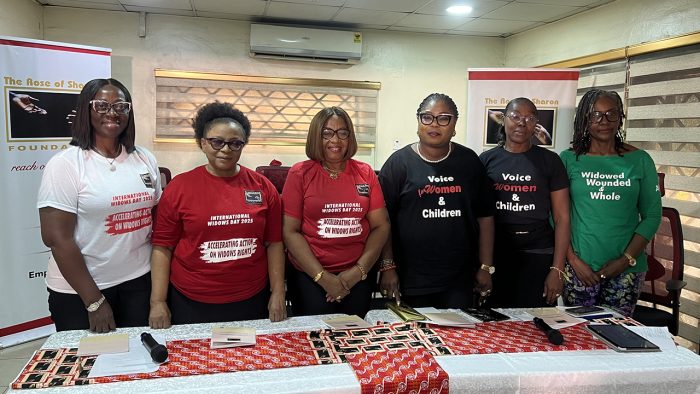Bringing again to the fore front, the plight of widows across the country, stakeholders have stressed the urgent need for the enactment of a comprehensive national law to protect the rights and welfare of widows in the country.
Speaking during this year’s commemoration of the International Widows’ Day, the Rose of Sharon Foundation (RoSF), in partnership with the International Federation of Women Lawyers (FIDA), said there are currently no laws or policies to protect widows’ rights and interests, leaving them at the mercies of harmful cultural and societal practices.
Held at RoSF headquarters in Lagos, legal experts, civil society advocates, widows and development partners were at hand to spotlight the systemic injustices faced by widowed women and to push for urgent legislative and policy reforms.
A major highlight of the occasion was the presentation of a landmark joint research titled, ‘A Report on the current state of widows’ rights in Nigeria: Advocating for specific socio-legal protection framework for widows.’
The research, led by the head of parliamentary and advocacy committee, FIDA, Lagos branch, Ifeyinwa Okpalaku, with contributions from Dr. Ndudi Bowei and Andrew Ochu-Baiye; offers an in-depth exploration of the legal, social, and cultural challenges that continue to deprive widows of their fundamental rights.
Giving a summary of the research, Dr Bowei said the study examines the current state of widows’ rights in Nigeria, highlighting the substantial challenges they experience with socio-economic inequalities, inhumane and degrading practices, in relation to relevant existing legal and judicial authorities.
“The research findings reveal that widows in Nigeria still face forced eviction, coercion, disinheritance, forceful remarriage, confinement, exclusion, socio-legal discrimination and trial by ordeal, due to harmful cultural practices, despite existing laws aimed at protecting their rights.
“This research emphasises the critical need for comprehensive sociolegal protection specific to widows unique experiences, including increased media awareness, mindset restructuring, empowerment and strict enforcement mechanisms to protect widows,” she said.
Lamenting poor media advocacy for awareness and empowerment especially at grassroots level, she said many widows lack knowledge of their rights, existing legal protection and recourse procedures for violations.
Dr. Bowei said that despite the existence of frameworks such as the Violence Against Persons Prohibition (VAPP) Act, widows in Nigeria still face gross human rights violations, including forced evictions, disinheritance, coerced remarriage, seclusion, and subjection to dehumanising traditional rites. These practices persist particularly in rural communities where harmful cultural norms remain deeply entrenched and access to justice is limited.
To address these challenges, the report proposes several practical and legislative measures, including, the establishment of a dedicated “Widows Help Desk” at relevant government agencies and strengthening of legal protections, enforcement and update of policy documents.
They also demanded the enactment of a national law specifically for the social-legal protection of widows across the country and full domestication and implementation of the VAPP Act across all states.
While calling for mindset restructuring, social and behavioural change communication (SBCC); inclusive social safety net programs and economic empowerment programs for widows, they seek local government accountability structures with a clear reporting pathway that allows communities, NGOs and CSOs to report violations directly.
In her address, RoSF founder, Folorunsho Alakija, expressed deep sorrow over widows’ situation and described it as a matter of national concern requiring urgent, collective intervention. She expressed annoyance that perpetrators often go away unscathed, saying she wants women to know their rights and what they’re entitled to.
“The role that tradition and culture plays in enforcing these harmful practices is what is most shocking to me. We need a law or policy that will address widows’ issues specifically. I urge the government to stop turning deaf ears to their suffering. These women are citizens; they deserve dignity and protection.”
Speaking, Okpalaku said the research started like a dream, “but I’m happy it has culminated into a working document today. We realised all the talking happens in urban cities but the nefarious acts go on in rural areas. We sourced data from the 36 states of the country and in some communities, we discovered many widows are in chains. In some communities, a widow that has no male child, even when she has five girls, will be recorded as having birthed no child. It goes beyond rallies and discussions, we need to take actionable steps and with this research, we are getting there,” she said.
President, Pan-African Widows Union and founder, Almanah Hope Foundation, Hope Nwakwesi, spoke about her personal experience of losing her husband at the age of 28. “In the space of just three months, I lost my husband, home and job. The whole experience almost drove me to suicide but I turned my pain to advocacy for widows. Our widow’s database now has over 30, 000 members. In 2019/2020 we prepared a widows’ protection bill and sent to the House of Representatives. However, we found out that cultural manipulation and government exclusion is a general problem across Africa. We need widows’ inclusion in all areas of life,” she said.



